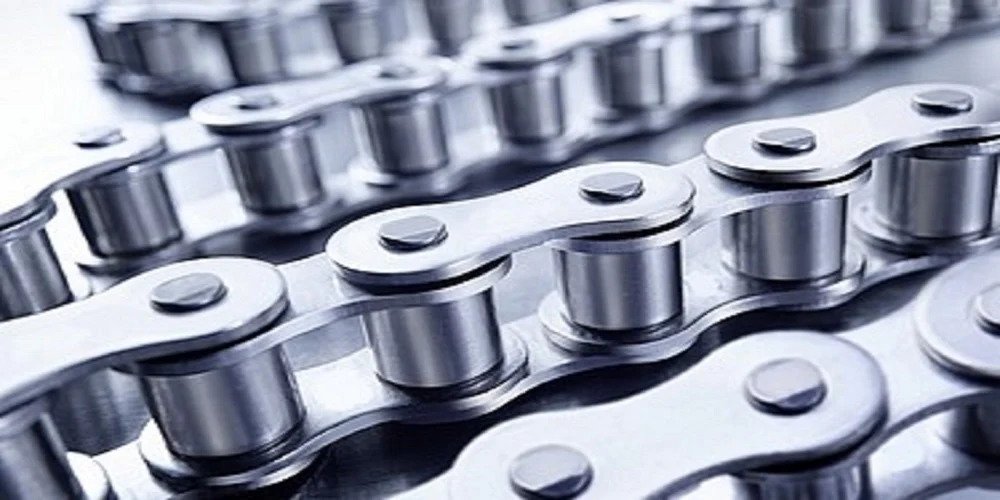In various industrial and commercial applications, chains serve as essential transmission and conveying components, making their performance and durability crucial. Stainless steel chains excel in wet environments due to their unique material properties, making them the preferred choice for many challenging conditions. This article explores the performance of stainless steel chains in wet environments, focusing on their corrosion resistance, strength, applications, and maintenance.
1. Corrosion Resistance of Stainless Steel Chains
The primary advantage of stainless steel chains is their exceptional corrosion resistance, attributed to their material composition, which typically includes chromium and nickel. In wet environments, ordinary carbon steel chains are prone to rust, leading to performance degradation and potential failure. Stainless steel chains, however, resist corrosion, maintaining their integrity and operational efficiency.
(I) Principle of Corrosion Resistance
Stainless steel forms a dense chromium oxide film on its surface, which effectively isolates water and oxygen, preventing further oxidation. This protective layer remains stable even in humid conditions, shielding the chain from corrosion.
(II) Corrosion Resistance of Different Stainless Steel Grades
Various stainless steel grades offer differing levels of corrosion resistance:
304 Stainless Steel: The most commonly used grade, offering good corrosion resistance for general humid environments.
316 Stainless Steel: Enhanced resistance to chloride ions, making it ideal for marine and salty industrial environments.
321 Stainless Steel: Superior high-temperature oxidation resistance, suitable for humid and high-temperature applications.

2. Strength and Wear Resistance of Stainless Steel Chains
Beyond corrosion resistance, stainless steel chains exhibit high strength and excellent wear resistance, allowing them to withstand heavy loads and prolonged friction in wet conditions without significant deformation or wear.
(I) High Strength
The strength of stainless steel chains comes from their material hardness and advanced manufacturing techniques. Processes like cold heading enhance the chain components' strength and hardness, improving overall tensile strength and resistance to breakage in wet environments.
(II) Wear Resistance
The wear resistance of stainless steel chains is attributed to their high surface hardness and smooth finish. Surface treatments like polishing or plating further enhance durability by reducing friction and minimizing wear.
3. Applications of Stainless Steel Chains in Wet Environments
Due to their superior corrosion resistance and strength, stainless steel chains are widely used across various industries that operate in humid or wet conditions. Common applications include:
(I) Food Processing Industry
Hygiene and cleanliness are paramount in food processing. Stainless steel chains, being corrosion-resistant and easy to clean, comply with food hygiene standards. They are commonly used in conveyor belts, washing lines, and packaging equipment. For example, in meat processing plants, stainless steel chains endure prolonged exposure to moisture and cleaning agents without rusting or contaminating food.
(II) Chemical Industry
The chemical industry often exposes chains to corrosive substances like acids, alkalis, and salts. Stainless steel chains resist such chemical exposure, making them suitable for transmission and conveying systems in chemical plants. For instance, they are used in reactor stirring devices where they must withstand both humidity and chemical corrosion.
(III) Marine Engineering
Marine environments pose significant challenges due to high humidity and salt exposure. Stainless steel chains perform exceptionally well in marine applications, including ships, port equipment, and offshore platforms. For example, stainless steel lifting chains are used at port terminals for cargo handling, maintaining functionality despite constant exposure to seawater and salt spray.
(IV) Water Treatment Industry
In water treatment facilities, chains must operate continuously in submerged conditions. Stainless steel chains offer corrosion resistance and durability, making them ideal for use in sewage treatment plants, filtration systems, and water pumps. For example, sludge conveyors in wastewater treatment plants rely on stainless steel chains to withstand prolonged exposure to chemicals and microorganisms.
4. Maintenance of Stainless Steel Chains in Wet Environments
Despite their excellent durability, proper maintenance is essential to maximize the lifespan and performance of stainless steel chains in wet environments.
(I) Regular Cleaning
Moisture, dust, and debris can accumulate on the chain surface over time. Regular cleaning removes these contaminants, preventing potential chemical reactions that could degrade the chain. Use a soft cloth and a neutral detergent, avoiding acidic, alkaline, or chlorine-based cleaners to preserve the protective chromium oxide film.
(II) Lubrication
Lubrication minimizes friction and reduces wear. In wet environments, it is essential to use waterproof lubricants such as high-temperature lubricating oil or food-grade lubricants. Ensure even application across all chain components to prevent lubricant loss.
(III) Inspection and Replacement
Regular inspections help identify signs of wear or corrosion early. Pay close attention to chain pins, rollers, plates, and overall tension. If excessive wear or corrosion is detected, replace affected components promptly to maintain safe and efficient operation.
5. Conclusion
Stainless steel chains demonstrate outstanding performance in wet environments due to their excellent corrosion resistance, high strength, and superior wear resistance. Their wide-ranging applications in food processing, chemical industries, marine engineering, and water treatment underscore their reliability under harsh conditions. By implementing proper maintenance practices such as cleaning, lubrication, and regular inspections, the service life of stainless steel chains can be extended, ensuring continuous and efficient operation. As a result, stainless steel chains remain the preferred choice for transmission and conveying systems in humid environments, offering durability and reliability for diverse industrial applications.
GIDI CHAIN LIMITED supply lots of roller chain, conveyor chain, Leaf Chain, welded chain, forged chain, Palm Oil Mill Chain, Hoisting Chain,Mine and Metallurgy Chain, etc. totaling over 3000 varieties. and 90% of chains are exported to worldwide, Which mainly export to Southeast Asia, European, North America, South America. Chains are welcomed by customers with the excellent quality. Our company owns more than 100 sets of advanced and professional manufacturing equipment, Perfect and rigorous QC system is implemented in every process from material purchasing to finished products packaging. Also, we have passed the ISO9001: 2015 Quality Management System Certification.
More Detail : www.gidi-chain.com
